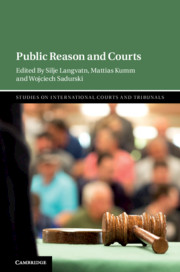Book contents
- Public Reason and Courts
- Studies on International Courts and Tribunals
- Public Reason and Courts
- Copyright page
- Contents
- Contributors
- Preface
- Acknowledgments
- 1 Taking Public Reason to Court: Understanding References to Public Reason in Discussions about Courts and Adjudication
- Part I Public Reason in Constitutional Courts
- Part II Public Reason in International Courts and Tribunals
- 9 European Court of Human Rights in Pursuit of Public Reason? A Study of Lost Opportunities
- 10 The Right to Justification in the Context of Proportionality: A Plea for Determinacy and Stability
- 11 “Going Public”: Reasoning and Justification at the World Trade Court
- Part III Critical Perspective on Public Reason in Courts
- Index
10 - The Right to Justification in the Context of Proportionality: A Plea for Determinacy and Stability
from Part II - Public Reason in International Courts and Tribunals
Published online by Cambridge University Press: 22 May 2020
- Public Reason and Courts
- Studies on International Courts and Tribunals
- Public Reason and Courts
- Copyright page
- Contents
- Contributors
- Preface
- Acknowledgments
- 1 Taking Public Reason to Court: Understanding References to Public Reason in Discussions about Courts and Adjudication
- Part I Public Reason in Constitutional Courts
- Part II Public Reason in International Courts and Tribunals
- 9 European Court of Human Rights in Pursuit of Public Reason? A Study of Lost Opportunities
- 10 The Right to Justification in the Context of Proportionality: A Plea for Determinacy and Stability
- 11 “Going Public”: Reasoning and Justification at the World Trade Court
- Part III Critical Perspective on Public Reason in Courts
- Index
Summary
The right to justification (RTJ) is borrowed from moral and political theory to offer normative guidance in the concrete and localized circumstances of the proportionality test. Based on the seminal work of Rainer Forst, Mattias Kumm has illustrated in various pieces how the RTJ operates in the proportionality context by identifying “excluded reasons” for limiting rights. However, Kumm does not clearly explain if the test also helps identify what the RTJ positively requires. This chapter aims to remedy this deficit in three steps: (1) present the core features of Forst’s account of the RTJ and emphasize the right that best demarcates the RTJ from rival accounts of human rights, namely the right to democratic participation; (2) reconstruct the precise role that the RTJ should play in proportionality analysis as suggested by Kumm, which the author insists on the common thread between Forst and Kumm, namely how the principle of mutual justifiability should inform the evaluative part of the proportionality test; and (3) show how the RTJ can help to balance two equally protected rights, expression and privacy, by reference to the practice of the European Court of Human Rights.
Keywords
- Type
- Chapter
- Information
- Public Reason and Courts , pp. 256 - 280Publisher: Cambridge University PressPrint publication year: 2020



